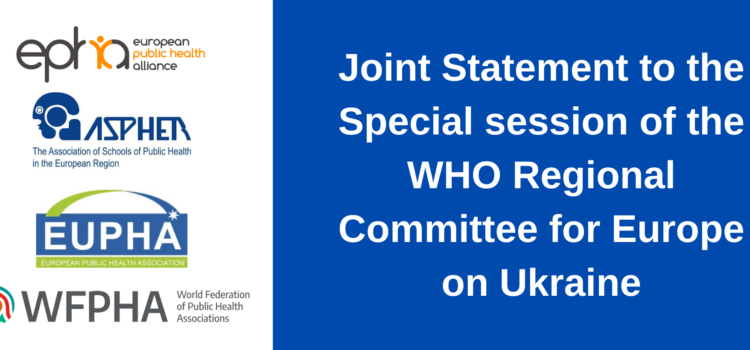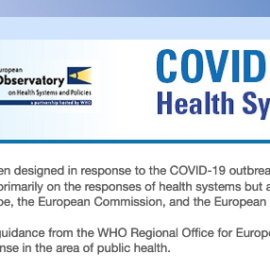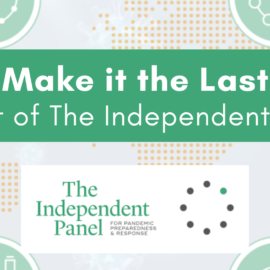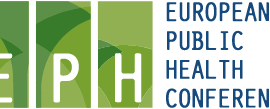
10 May 2022
The European Public Health Alliance (EPHA), the European Public Health Association (EUPHA), the Association of Schools of Public Health in the European Region (ASPHER), and the World Federation of Public Health Associations (WFPHA), the leading European and international public health civil society organisations, express their deep concern about the devastating impact of the war in Ukraine on people’s physical and mental health. Standing by hundreds of our members and partners, we support the WHO Regional Committee for Europe in calling for an immediate cessation of military aggression and for a transition to peaceful negotiations, allowing for the necessary health and social support to every person in need.
With 13 million people displaced, 16 million in need of assistance, and almost 6 million refugees fleeing Ukraine, the humanitarian and health crises have reached proportions unseen in Europe since the Second World War, spilling over to other countries, including Russia, with direct and indirect health impacts within and beyond the WHO European Region.
Lasting Impacts on Healthcare and Public Health
We are witnessing the largest attack on the health system in recent history, with public health effects to be felt for generations to come:
- Over 200 verified attacks on health care facilities;
- Mass casualties, conflict-related trauma and injuries;
- Disruption of essential health services and medical supply chains;
- Excess illness and death from noncommunicable diseases;
- Emergence and spread of infectious diseases, fuelled by missed vaccination;
- Maternal and children’s health deterioration;
- Mental and psychosocial health decline;
- Human trafficking and gender-based violence;
- Radiological and chemical threats;
- Health workforce burnout.
Worsening Health Inequalities
We are particularly concerned about the accompanying widening of health inequalities, disproportionately impacting disadvantaged and vulnerable groups, including ethnic minorities, low socio-economic groups, and the homeless, who have little to no resources and who are impacted most. We anticipate that the implications of the crisis on nutrition and energy security will be most felt by the most vulnerable.
Health Requires Peace
While commending the solidarity and resolve shown so far, we call on the international community, in particular the Member States of the WHO European Region, to do everything in their power to secure health and humanitarian principles as key drivers of peace.
We call on governments and political leaders to support Ukraine as it protects and promotes the health of its people, to assist the neighbouring countries who are protecting the human and health rights of all refugees regardless of their national, ethnic or racial background, to act resolutely against human trafficking and gender based violence, to secure humanitarian corridors that allow the transit of medical supplies and workers to the affected zones while hostilities continue, and in general to mitigate all threats to public health.
Moreover, we call on governments to counteract the implications of the crisis on nutrition and energy security, consistent with a move to sustainable, resilient food and energy systems.
With civil society organisations proving once again crucial in supplying support, rapid response, and humanitarian aid where others cannot, we urge governments to prioritize support to the work of these organisations, offering resourcing, communication and coordination support in responding to emergency and ongoing health needs.
Finally, as the health community cannot remain silent in the face of ferocious attacks on health, we welcome the resolution EUR/RCSS/CONF./2 Rev.2 as adopted at the special session of the WHO Regional Committee for Europe, noting that its content reflects the deep gravity of a situation requiring exceptional measures.



